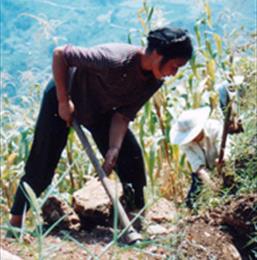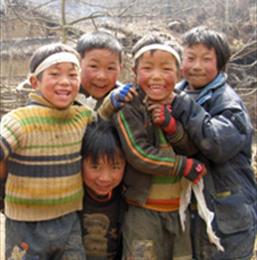Apr / Jun 2021No. 153
30th June 2021
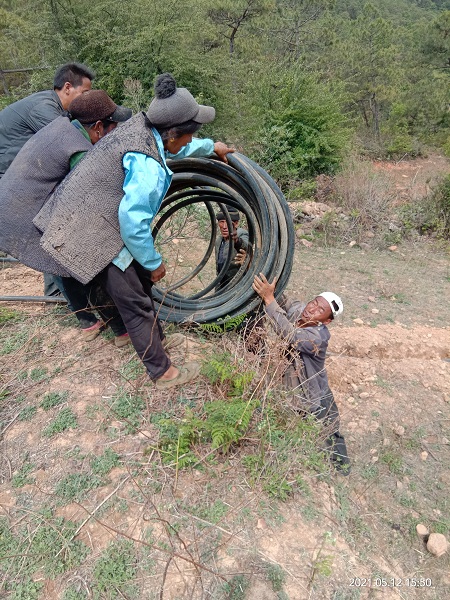
Ma Chang village layout of drinking water pipeline
Project Progress
Integrated Rural Development Project in Hanyuan County
Dragon Boat Festival Activities in Pianma Village
With the Dragon Boat Festival coming, in order to increase the cohesion of the community and create a harmonious community environment, as well as to enhance the friendships and awareness of the traditional culture and customs in between villagers, the village committee of Pianma village approached DORS and asked for support to hold a celebration activity. After discussion with the committee, we decided to support them and signed an agreement with the village, which included the budget and detailed activities. The village committee was responsible to organize the activity.
.jpg)
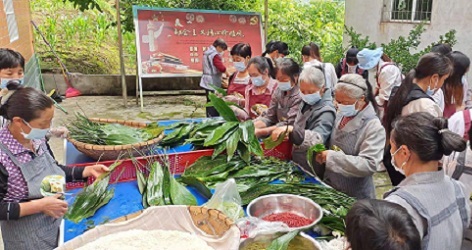
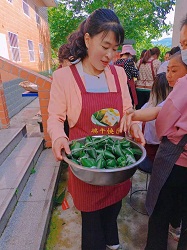
The villagers packed zongzi in groups Send zongzi!
On 10th June 2021, the village volunteers started to prepare in the early morning, e.g. thermometer, washing the leaves, preparing the food and so on. At 10 a.m., all village participants arrived and had their temperatures taken according to the Epidemic prevention requirement when entering the activity site. And then, all participants were divided into 15 teams, each team has a volunteer to show them how to make the Zongzi (Zongzi is made of glutinous rice stuffed with different fillings and wrapped in bamboo leaves) with the prepared materials. At the same time, the director of village Women Federation presented to all people the cultural story of this Festival Origin and Customs. At 12:30, all 500 zongzi were made with the joint efforts of all volunteers and villagers and taken to be cooked. Some villagers were seated and chatted with each other in the activity room, and some villagers performed singing and played instruments. When the Zongzi were well cooked, each one received 4 Zongzi, and the rest Zongzi were sent to the elderly people and the disadvantage villagers. Our project always paid attention to the elderly and poor families.
The village committee showed very good ability in the organization and coordination in this event, they also received very good feedback from villagers, especially in taking care of the elderly and disadvantaged families. Villagers are willing to have more of these kind of activities in the future.
Baseline Study in Pianma Village and Ranmo Village
On 16th -17th June 2021, our project team visited Pianma Village and Ranmo Village to carry out the baseline study, which included the household investigation to collect the information of the needs and difficulties of women, elderly and disadvantaged people.
The project team got an overall understanding and impression of the two villages through the survey. At the same time, we also built a good communication bridge with the committee and villagers by this visit, which help us easily and precisely to get all the data and information to better plan and implement the project.On top of that, we have secured sustainable human resources for the project community.
The visit provided us with more, the village committee and villagers touched the project team deeply with their passion and initiative, welcoming guests from outside in their plainest manner. Their kindness and warmth serves not only as a local card, but also the fertile soil to cultivate better lives in the future.
Integrated Rural Development Project in Xide County
Income Generation Development Project for Disadvantaged families
The Income Generation Development project for disadvantaged families was launched In March. The project supported 30 disadvantaged families in the two villages. Some family members have physical disabilities, some have got severe diseases, some were divorced or widowed in villages. The project provided a fund of 2300 RMB for each household according to their labor ability, livelihood development thoughts and so on, a total of 69000 RMB had been delivered to assist them doing something to improve their income. For example, some raised pigs, and told us that their pigs have got pregnant and will give birth in September. Some families raised goats and will have kids in the next year, so that they can buy new clothes for their old parents. All livelihood projects were running well according to our project team investigation. Villagers told us that they have become more confident to get through their current difficulties.
The "pass on" model helps the development of livestock in village
"Why do we need to give the piglets and goats to other villagers for free?” “Why not distribute the project funds equally between each household?” “How to ensure everyone follow the rules?” When we first talked to villagers about the “pass on” model, they couldn’t accept the model in the Machang Village.
“What’s about passing on to my family members, for example, parents to son, or between brothers?” “Do you have any requirement to ensure the quality of the livestock, or do we just give what we want to give?” Although we have reached some agreement at a certain degree at this time, this still was not the expectation of the projects original designed.
“Let's figure out how to make the model functioning. Except for the 5000 RMB supporting from the project, we still need to spend 500-1000 RMB so that we can buy 3 matured sows, which could give birth to 6-10 piglets by each sow. In this case, we can pass on 6 piglets to the next family from the 3 sows. If we buy goats, we can have 4, and each one gives birth to 2 kids in a year, so we can pass 4 kids in total on to the other family. All the piglets or small goats needs to be over 20 kg which could better survive and good for other families to raise”.
This was the third round discussion with villagers and they started to think of how to work together to have a better bargain in the market in the future and willing to help each other with the limited resources.
"We would like to try a women’s group as a pilot, and then extend to the whole village, and if we can’t make a success of it we won’t lose too much. We all have the confidence to run this project well and follow the regulations”. After several rounds of discussion with villagers, we decided to start the pilot project in the women’s group in order to reduce the project risk.
"The beneficiary households in the pilot project should follow certain standards: they must be members of the women's group, have a livestock sty, have labor force, have willingness, and have participated in technical training. If the project pigs or goats die, they need to use their own livestock and continue to follow the rules, otherwise the whole project stops. The people who receive the passed on livestock can't be the relative to the beneficiary household in case of cheating. The “pass on” model needs to reach to the last family to guarantee all participants get a pig or a goat kid. In order to have technical management for the livestock, the women’s group needs to not only select a group leader, but also to select technicians and sales persons, in order to build a good management system for raising and selling... All the project operation mechanisms such as the selection method, pass on mechanism, reward and punishment mechanism and women's group project management were set up by women during the pilot project meeting and will be publicized in the village.
We have done the beneficiary households list, and finished household investigations for the second time to check the household information. The list was publicized in the village. We will conduct the training and complete the first fund delivery during July and August. The first “pass on” will start this December and complete in March of 2022.
We always think about how to use limited resources to benefit more people, and how to use small investment to work for more farmers; The “pass on” model was a way that we designed to help the community build their own sustainable development method. Hopefully this can reach the sustainability.
“Access to clean water” the drinking water project in Machang village Hamlet 3
During April-May 2021, after investigation, we decided to support the drinking water project for the 20 households, who live in the highest mountainous area. Firstly, we worked out the project plan with villagers to make sure the water source, materials procurement and management, technical support, villagers labour force plan, construction safety management, water management and so on, were in place. This project was carried out successfully.
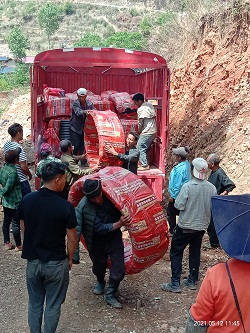 To review this project, the transparency of the procedure was one of the very important issues to ensure the project is implemented successfully: this project was a joint effort, DORS provided funds for materials such as pipes, cement and construction tools, villagers provide labour force and construction management. They set up a project management team, and selected a team leader, a technician, a purchaser and materials keeper. The team leader was responsible for arranging villagers to work for the project everyday. The technician received technical training from DORS and trained others. The purchaser was responsible for materials procurement and invited DORS staff and project management team leader to purchase all materials with them and the material keeper was responsible for materials distribution and record.
To review this project, the transparency of the procedure was one of the very important issues to ensure the project is implemented successfully: this project was a joint effort, DORS provided funds for materials such as pipes, cement and construction tools, villagers provide labour force and construction management. They set up a project management team, and selected a team leader, a technician, a purchaser and materials keeper. The team leader was responsible for arranging villagers to work for the project everyday. The technician received technical training from DORS and trained others. The purchaser was responsible for materials procurement and invited DORS staff and project management team leader to purchase all materials with them and the material keeper was responsible for materials distribution and record.
When the project finished, we had a conclusion meeting: firstly, clarifying the ownership of water source is to avoid the future conflict within villagers; secondly, we drew up different water resource allocation plans for wet season and dry season, therefore to balance the water shortage problem in the village; thirdly, a comprehensive technical plan to improve the efficiency of the materials usage and labour force. Besides this, we also trained 3 masons and one technician of pipe installation for the community. Villagers have worked on this project, which made them have the ownership to the project. After full discussion with the villagers, they had reached agreement and signed their fingerprint on the safety management action plan, which ensured the construction following the safety rules. The whole project implementation procedure was successful without any accidents.
House Hygiene Training
During 25th -26th May 2021, we organized house hygiene training in Hamlet 3 of Machang Village and the Kindergarten area of Siguojue village respectively, a total of 41 women participated in the training.
The training included PPT, experience sharing and communication. We showed the women what is the household hygiene standard through the PPT pictures, and shared with them how often to clean their kitchen, living room, bedroom as well as to wash their clothes and bedding frequently. An aunty told us that: she has never cared about the hygiene of the bed, but now she has a strong desire to buy a mattress and a new quilt after seeing the PPT pictures. She wants to have a hygienic and comfortable bed and she will change her living style to clean her house.
This basic training was aimed at improving women’s awareness of making a clean and good environment. This was also the first phase to promote women's action, which provided a standard in our second phase of organizing a household hygiene competition. Village women started to realize the importance of the household hygiene and how to make changes to improve the environment of the whole community area, which is not possible unless women place enough emphasis on household hygiene and stop littering.
This project also prepared some trash cans and garbage bags which were given to women, so as to help them turn the training lessons into practical action. And the follow-up competition will encourage some women to take action of cleaning the environment first, and then to promote more to women join in the activity. Our goal was to help the two communities improve their environment through household participation.
Houses Cleaning Competition
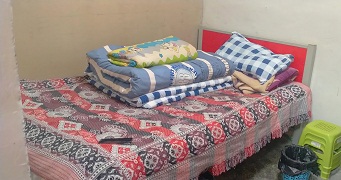 During 16th -17th June, three competitions of the household hygiene were carried out at Hamlet 3 upper area, and kindergarten area of Machang Village and Siguojue village respectively. 11 women and 1 man from Hamlet 3 upper area, with ages ranging from 35-65 years; 11women from kindergarten area aged from 37-63 years; 25 women from Siguojue village aged of 22-66 years old; a total of 47 women and 1 man participated in this competition.
During 16th -17th June, three competitions of the household hygiene were carried out at Hamlet 3 upper area, and kindergarten area of Machang Village and Siguojue village respectively. 11 women and 1 man from Hamlet 3 upper area, with ages ranging from 35-65 years; 11women from kindergarten area aged from 37-63 years; 25 women from Siguojue village aged of 22-66 years old; a total of 47 women and 1 man participated in this competition.
The competition based on the scoring for 9 criteria: the cleanliness of the living room floor (no garbage and stains), sofa, the bedroom, the sheets and quilt; the clothes and shoes were clean and neatly placed, no garbage in the kitchen, the kitchen was clean and tidy, neatly dressed, family members washed face and brushed teeth (adults & children), and the courtyard was clean and all goods were neatly placed. After two days scoring, a total of 4 special prices and 6 first prizes was awarded.
This was the first time that women have cleaned their houses and made them so neat and tidy, until they almost couldn’t recognize their own home. They always put clothes and shoes everywhere and didn't use to make the bed and sofa in alignment. Dishes were laid for the next day to wash. After cleaning, the house environment has become better and they all felt happier than before.
Fuel-Efficiency Stove Project
Launch the Stove Project in Shaping Village of Anle Town of Hanyuan County - to collect the registration and sign the agreement of the project
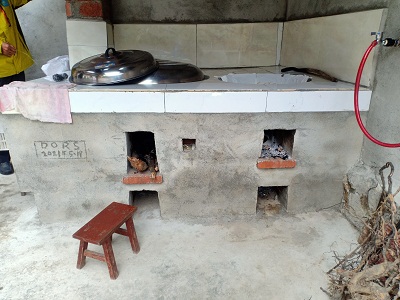 DORS staff held a project meeting in Yuanchonglin Village and Shaping village separately on 22nd April, to explain the stove project details, procedures and requirement for villagers. We also transmitted the environmental protection concept through the information on how to use the Fuel-efficiency stoves in the meeting. 18 households signed up to participate in the project and provided 100 RMB as the project deposit. A villager was selected to be in charge of the project management at this meeting.
DORS staff held a project meeting in Yuanchonglin Village and Shaping village separately on 22nd April, to explain the stove project details, procedures and requirement for villagers. We also transmitted the environmental protection concept through the information on how to use the Fuel-efficiency stoves in the meeting. 18 households signed up to participate in the project and provided 100 RMB as the project deposit. A villager was selected to be in charge of the project management at this meeting.
On 3rd June, our project staff went to the village again to check the project progress and the quality of the construction and building of stoves, as well as to train the local villagers. 10 stoves have been finished and we will follow up the project progress.
Things and People in the Village
[Ms Ah Xia, was trying to get out of the hardship of life.] When we first visited Machang Village of Xide County in July 2021, we met Ms Ah Xia, who was 37 years old and living in very difficult life circumstances. Her husband worked in downtown but earned nothing, she had to take care of 5 children at home. Due to this she wasn’t satisfied with her life, she felt that everyone around her was full of hostility. She even thought someone might put pesticides into her vegetable field to let her get poisoned. Her health got worse, and she didn't want to talk to others. Every time we visited her, she didn’t talk and her children only had cold buckwheat buns to eat.
At the beginning of 2021, the household development project for disadvantaged families was launched. Ah Xia became one of the 30 households participating in the project. When all participants bought pigs or goats according to the project requirement and then received funds, Ah Xia didn't buy anything. She told the project staff: " I want to buy the livestock, but I don’t have money at the moment. 2300 RMB of the project fund is very important to me. Can I get the fund to buy the livestock directly?” Considering her situation, our project staff accompanied her to the local market to buy sows. However, she didn’t find a suitable one in the market, then using an afternoon we went to a remote farm and finally bought two sows. When the two sows were loaded on the tricycle, Ah Xia was tearful and repeated the thanks to our staff. We also felt grateful to her for her honesty.
This project provided villagers an opportunity to increase their income, which also improved their confidence to change their lives. When we went for the second time to Ah Xia’s home in July, you couldn’t find too much had changed in her house, but her face was full of happiness and hope. By the way, her husband also earned some money and came back home. The two sows will get pregnant and she can sell the piglets if the sows give birth in late December, and then she can pay back the money she owned to see doctor. She is planning to build a new pigsty to raise more pigs when her husband comes back in October.
DORS is always focusing on women, children, disabled people and poor families during the project implementation process. We want to help more people, like Ah Xia, to get rid of difficulties and improve their self confidence.
Visit and Training
Training for Village e-commerce Leaders
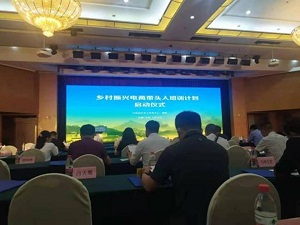 During June 17-20, 2021, Siguojue village Secretary commissioned the project manager Zhang Xiulei to accompany two cooperative members of Siguojue village to go to participate in the Rural Vitalization e-commerce leaders training, which was conducted by China international e-commerce center and Meituan. The training provided a systematic overview of the e-commerce new model, new opportunity and challenges at county level, brand design and promotion, and also the construction and operation of the e-commerce supply chain for agricultural products at county level, the cultivation of web celebrity and agricultural special products marketing. The training also shared the experiences of rural e-commerce business opportunities and successful cases, with the Meituan businesses models.
During June 17-20, 2021, Siguojue village Secretary commissioned the project manager Zhang Xiulei to accompany two cooperative members of Siguojue village to go to participate in the Rural Vitalization e-commerce leaders training, which was conducted by China international e-commerce center and Meituan. The training provided a systematic overview of the e-commerce new model, new opportunity and challenges at county level, brand design and promotion, and also the construction and operation of the e-commerce supply chain for agricultural products at county level, the cultivation of web celebrity and agricultural special products marketing. The training also shared the experiences of rural e-commerce business opportunities and successful cases, with the Meituan businesses models.
This training has strengthened the confidence of the two cooperatives to develop the villages’ industries, and clarified the future development thinking, at the same time to provide ideas and thoughts for the project team to work with the cooperatives. Inspired by this training, DORS will integrate project resources and launch the industrial development project in Siguojue village.
About Us
DORS has been adhering to using the participatory approach throughout all projects, focusing on the village sustainable development since its establishment. DORS works closely with local villagers, provides the opportunity and encourages stakeholders to make design decisions, plan, implement and manage project on their own. The projects funded by DORS will try to benefit the whole community, especially the women, children, disabled people and poor families.
DORS built a project implementation system: project staff are the key persons, office staff is the back up and volunteers to support to work for a project. This big family members have their own duties and good cooperation to work for the local villagers.
2021 will be a special year under the COVID-19, but we will work together to reach our goal.
Hope the world will be more beautiful.

